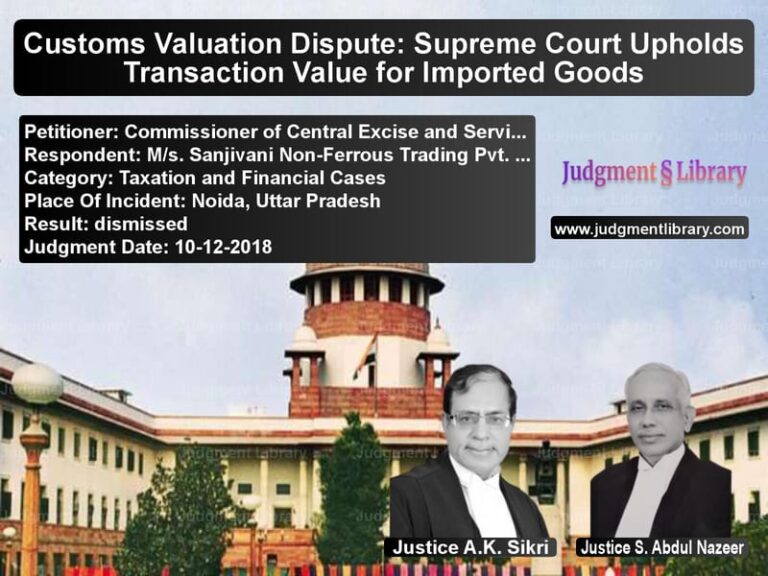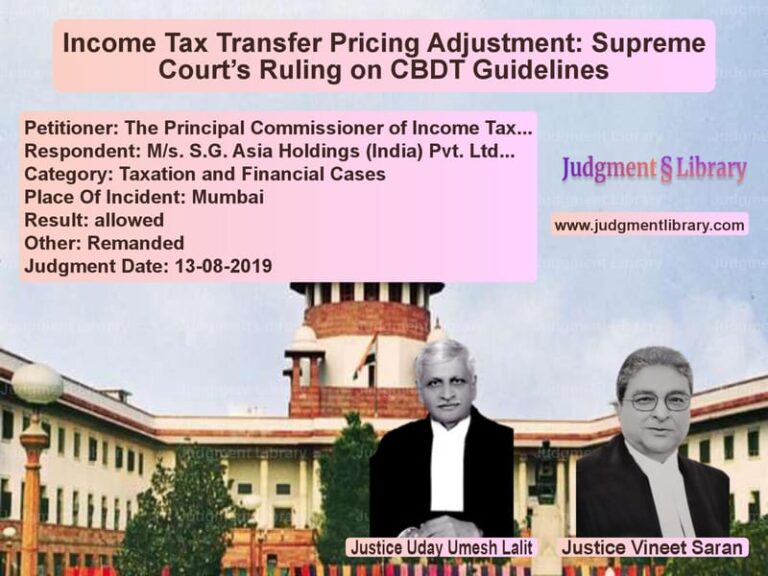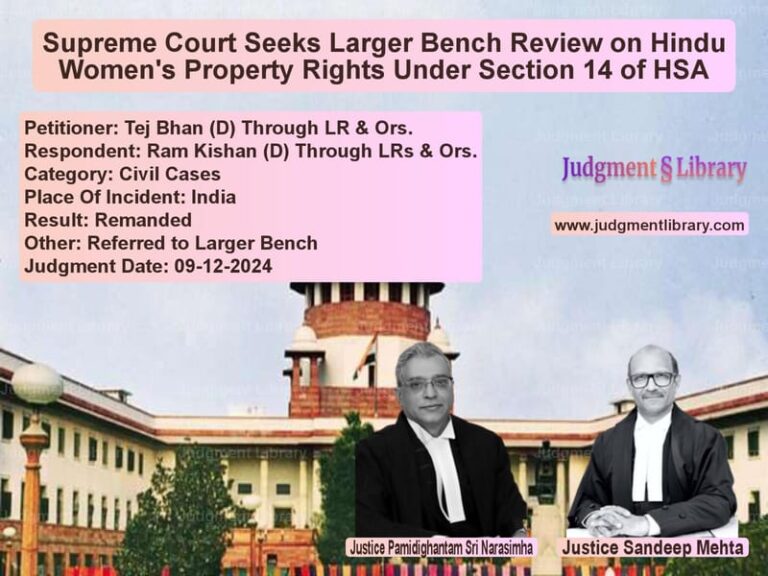Maratha Reservation Struck Down: Supreme Court Reinforces 50% Quota Ceiling
The Supreme Court of India has delivered a landmark verdict in the case of Dr. Jaishri Laxmanrao Patil v. The Chief Minister & Ors., striking down the reservation granted to the Maratha community in Maharashtra. The ruling reaffirms the 50% ceiling on reservations set by the Indra Sawhney judgment and clarifies the implications of the 102nd Constitutional Amendment.
Background of the Case
The dispute began with the enactment of the Maharashtra State Socially and Educationally Backward Classes (SEBC) Act, 2018, which provided 16% reservation to the Maratha community in education and public employment. This was challenged in the Bombay High Court, which upheld the law but reduced the reservation to 12% in education and 13% in public employment, citing compliance with the recommendations of the Gaikwad Commission.
Several petitions were filed before the Supreme Court, arguing that the SEBC Act violated the constitutional mandate by breaching the 50% cap on reservations established in the landmark Indra Sawhney v. Union of India (1992) case. The Court had to decide whether the Maratha reservation could be justified under the exceptional circumstances doctrine and whether the 102nd Constitutional Amendment limited the State’s power to identify backward classes.
Arguments by the Petitioners
The petitioners challenging the reservation made the following key arguments:
- The SEBC Act exceeded the 50% reservation ceiling set in Indra Sawhney, and there were no extraordinary circumstances justifying the excess.
- The Gaikwad Commission report did not provide sufficient data to categorize Marathas as a backward class warranting separate reservations.
- The Maratha community had historically been a dominant and politically influential group in Maharashtra, making its classification as backward unjustifiable.
- The 102nd Constitutional Amendment limited the power of States to declare any community as backward; only the President, in consultation with the National Commission for Backward Classes (NCBC), had such power.
- The reservation granted violated Articles 14 (Right to Equality) and 16(1) (Right to Equal Opportunity in Public Employment) of the Constitution.
Arguments by the Respondents (State of Maharashtra)
The State of Maharashtra, defending the SEBC Act, argued:
- The Gaikwad Commission had conducted an extensive study over 15 months and found that Marathas were socially and educationally backward.
- The State had the authority to classify backward classes, and the 102nd Constitutional Amendment did not take away this power.
- The 50% cap on reservations was not an absolute rule; it could be exceeded in exceptional circumstances, and the backwardness of the Maratha community justified such an exception.
- The reservation was necessary to ensure adequate representation of the Maratha community in public services.
- Since the Bombay High Court had already reduced the percentage of reservation, the Supreme Court should not interfere.
Supreme Court’s Observations and Judgment
1. Reaffirmation of the 50% Ceiling on Reservations
The Court held that the 50% cap on reservations was a well-settled principle laid down in Indra Sawhney and could not be breached unless exceptional circumstances were demonstrated. It ruled:
“The reservation policy must balance affirmative action with the fundamental right to equality. The limit of 50% must not be breached unless exceptional circumstances are made out, which the present case does not satisfy.”
2. Absence of Extraordinary Circumstances
The Supreme Court rejected the argument that the Maratha community faced extraordinary hardships justifying an exception to the 50% rule. It stated:
“No exceptional circumstances have been demonstrated that would warrant exceeding the 50% ceiling. The Maratha community, though facing socio-economic challenges, does not fulfill the criteria to be considered as an extraordinary category.”
3. Effect of the 102nd Constitutional Amendment
One of the critical issues in this case was whether the 102nd Constitutional Amendment, which introduced Article 342A, took away the State’s power to identify backward classes. The Court held:
“After the 102nd Constitutional Amendment, the identification of socially and educationally backward classes must be done by the President in consultation with the National Commission for Backward Classes. The power of States in this regard has been removed.”
This interpretation significantly impacted how States could grant reservations moving forward.
4. Legality of the SEBC Act
Considering the above findings, the Court ruled:
“The Maharashtra SEBC Act, 2018, providing for Maratha reservation is unconstitutional as it violates the 50% reservation ceiling and lacks justification under exceptional circumstances.”
The Act was struck down in its entirety.
5. Protection for Maratha Students and Employees
Recognizing that students and employees had already benefited from the SEBC Act, the Court allowed protections:
- Students admitted under the Maratha quota before the verdict would not be affected.
- Appointments made under the quota before the judgment would remain valid.
- However, no fresh appointments or admissions under the Maratha quota would be permitted.
Impact of the Judgment
The Supreme Court’s ruling had far-reaching consequences:
- It reaffirmed the 50% ceiling as a crucial principle in reservation policy.
- It clarified that States could no longer unilaterally designate backward classes post-102nd Constitutional Amendment.
- It set a precedent affecting other States attempting to breach the 50% quota.
- The ruling also brought clarity to the role of the National Commission for Backward Classes in determining reservations.
Conclusion
The Supreme Court’s verdict in the Maratha reservation case reaffirms the importance of maintaining a balance between affirmative action and the fundamental right to equality. By striking down the SEBC Act, the Court upheld the sanctity of the 50% ceiling and clarified the role of the 102nd Constitutional Amendment in reservation matters.
Going forward, any attempts by States to exceed the 50% cap will require a stringent demonstration of exceptional circumstances. This judgment serves as a crucial precedent in ensuring that reservation policies are implemented within the constitutional framework while protecting the rights of all communities.
Petitioner Name: Dr. Jaishri Laxmanrao Patil.Respondent Name: The Chief Minister & Ors..Judgment By: Justice Ashok Bhushan, Justice S. Abdul Nazeer, Justice L. Nageswara Rao, Justice Hemant Gupta, Justice S. Ravindra Bhat.Place Of Incident: Maharashtra.Judgment Date: 05-05-2021.
Don’t miss out on the full details! Download the complete judgment in PDF format below and gain valuable insights instantly!
Download Judgment: dr.-jaishri-laxmanra-vs-the-chief-minister-&-supreme-court-of-india-judgment-dated-05-05-2021.pdf
Directly Download Judgment: Directly download this Judgment
See all petitions in Fundamental Rights
See all petitions in Constitution Interpretation
See all petitions in Public Interest Litigation
See all petitions in Judgment by Ashok Bhushan
See all petitions in Judgment by S. Abdul Nazeer
See all petitions in Judgment by L. Nageswara Rao
See all petitions in Judgment by Hemant Gupta
See all petitions in Judgment by S Ravindra Bhat
See all petitions in dismissed
See all petitions in Quashed
See all petitions in supreme court of India judgments May 2021
See all petitions in 2021 judgments
See all posts in Constitutional Cases Category
See all allowed petitions in Constitutional Cases Category
See all Dismissed petitions in Constitutional Cases Category
See all partially allowed petitions in Constitutional Cases Category







